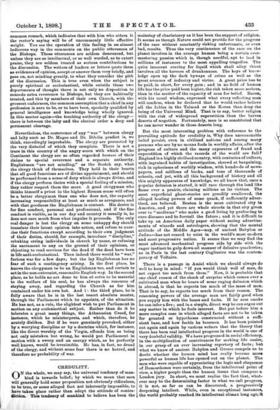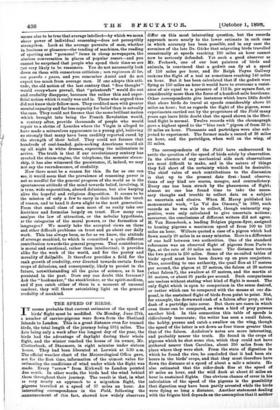CREDULITY.
ON the whole, we may say, the universal tendency of man- kind is towards belief ; by which we mean that men will generally hold some proposition not obviously ridiculous, to be true, or some alleged fact not inherently impossible, to have taken place rather than adopt the attitude of contra- diction. This tendency of mankind to believe has been the
mainstay of charlatanry as it has been the support of religion. It seems as though Nature could not provide for the progress of the race without constantly risking unfortunate, or even bad, results. Thus the very continuance of the race on the planet involves in the average human being a certain over- mastering passion which is, though needful, apt to lead in millions of instances to the most appalling tragedies. The quite innocent craving for liquid which shall allay thirst involves all the horrors of drunkenness. The keys of know- ledge open up the dark byways of crime as well as the great avenues of industry and virtue. A great price has to be paid, in short, for every gain ; and in no field of human life has the price paid been higher, the risk taken more serious, than in the matter of the capacity of man for belief. Bacon, with his usual wisdom, expressed what every reflecting man will confirm, when he declared that he would rather believe all the fables in the Talmud or the Koran than deny the being of the Universal Mind. That is to say, better religion with the risk of widespread superstition than the barren deserts of negation. Fortunately, man is so constituted that he can never wander in those deserts long.
But the most interesting problem with reference to the prevailing aptitude for credulity is, Why does unreasonable belief persist, even in civilised nations and among many persons who are by no means fools in worldly affairs, after the progress of culture and the many exposures of fraud and superstition of which the records of the world are full P England is a highly civilised country, with centuries of culture, with ingrained habits of investigation, shrewd at bargaining, rich in aphorisms of worldly wisdom, with hundreds of news- papers, and millions of books, and tens of thousands of schools, and yet, with all this background of history and all this mighty apparatus of knowledge, we all know that, once a popular delusion is started, it will race through the land like flame over a prairie, claiming millions as its victims. The most superficial ghost-stories are greedily swallowed, the alleged healing powers of some quack, if sufficiently adver- tised, are believed. Boston is the most cultivated city in America, and yet there are whole streets in that city given over to " mediums " who make a good living by professing to cure diseases and to foretell the future ; and it is difficult to take up an American daily paper without seeing advertise- ments of wizards and astrologers, showing that the mental attitude of the Middle Ages—nay, of ancient Babylon or Judea—has not ceased to exist in the world's most modern and most progressive nation. It seems that we may find the most advanced mechanical progress side by side with the eager instinct to gulp down all manner of delusive quackeries ; as in Paris in the last century Cagliostro was the contem- porary of Voltaire.
There is a passage in Amiel which we should always de well to keep in mind : "If you would think well of men, do not expect too much from them." Now, it is probable that one chief reason of the shock of surprise which comes over a cultivated man when he hears of some raging delusion which is abroad, is that he expects too much of the mass of men. That is to say, he expects too much from their reason. The reasoning powers of the average man are fairly good when you supply him with the bases and facts. If he sees smoke he can infer a fire ; and in a simple, direct way he can argue out any matter in which he feels interest. But put before him a more complex case in which alleged facts are not to be taken for granted or hypotheses constructed without a suffi- cient base, and how feeble he becomes. It has been pointed out again and again by various writers that the theory that there has been real intellectual progress in the world is one of very doubtful validity. We have progressed in social efficiency, in the multiplication of contrivances for making life easier, in our grasp of an ever increasing repertory of facts ; but what we know of ancient Babylon and Greece compels us to doubt whether the human mind has really become more powerful as human life has opened out on the planet. The men who were capable of appreciating the logic and eloquence of Demosthenes were certainly, from the intellectual point of view, a higher people than the human items that compose a London jury. In short, we must realise the fact that, what- ever may be the determining factor in what we call progress, it is not, so far as can be discovered, a progressively deepening intellect. While, even in exceptional instances, the world probably reached its intellectual climax long ago, it seems also to be true that average intellect—by which we mean sheer power of individual reasoning—does not perceptibly strengthen. Look at the average pursuits of men, whether in business or pleasure—the tending of machines, the reading of sporting and "personal" items in cheap newspapers, the aimless conversation in places of popular resort—and you cannot be surprised that people who spend their time so are -not very likely to be reasoners. You do not necessarily look down on them with censorious criticism ; non ragionarn di lor, sea guards e passe, and you remember Amiel and do not expect too much from average men. If one adopts this atti- tude, the old notion of the last century that "free thought" would everywhere prevail, that "priestoraft " would die out and credulity disappear, becomes the rather thin and super- ficial notion which it really was and is. Those who argued thus did not know their fellow-men. They credited men with greater mental capacity and far less capacity for belief than is actually the case. They could not foresee that the same brilliant nation which brought into being the French Revolution would, a century after, provide thousands of people who would repair to a shrine of Lourdes where the Virgin is alleged to have made a miraculous appearance to a young girl, believing HO strongly that many have been credibly reported cured by the strength of their belief. They could not foresee that hundreds of cool-headed, gain-seeking Americans would sit up all night in white dresses, expecting the millennium to arrive. The truth is that if our revolutionary century has created the steam-engine, the telephone, the monster steam- ship, it has also witnessed the persistence, if, indeed, we may not say the recrudescence, of credulity.
Now there must be a reason for this. So far as one can see, it would seem that the prevalence of reasoning power is not so needful for the general progress of the world as is the spontaneous attitude of the mind towards belief, involving, it is true, wide superstition, absurd delusions, but also keeping alive the hopeful and religious disposition. It seems to be the mission of only a few to carry in their hands the torch of reason, and to hand it down alight to the next generation. From that small class of men most of us really take our doctrines and formulas largely on trust. How many can analyse the law of attraction, or the nebular hypothesis, or the categories of the moral powers, or the formation of languages ? We mostly take the accepted views on these and other difficult problems on trust and go about our daily work. This has always been, so far as we know, the attitude of average mankind, to which is committed a quite different contribution towards the general progress. That contribution is moral and emotional, rather than intellectual; it provides alike for the work of the world, and for the poetry and morality of dailyalife. It therefore provides a field for the rank growth of credulity, ever directed towards certain fresh crops of delusions, and consequently, likely to persist in the future, notwithstanding all the gains of science, as it has persisted in the past. Does any one doubt this forecast? Ask the "bookmaker," the stockbroker, or the spirit-medium, and if you catch either of them in a moment of unusual candour, they will throw astonishing light on the general credulity of mankind.







































 Previous page
Previous page